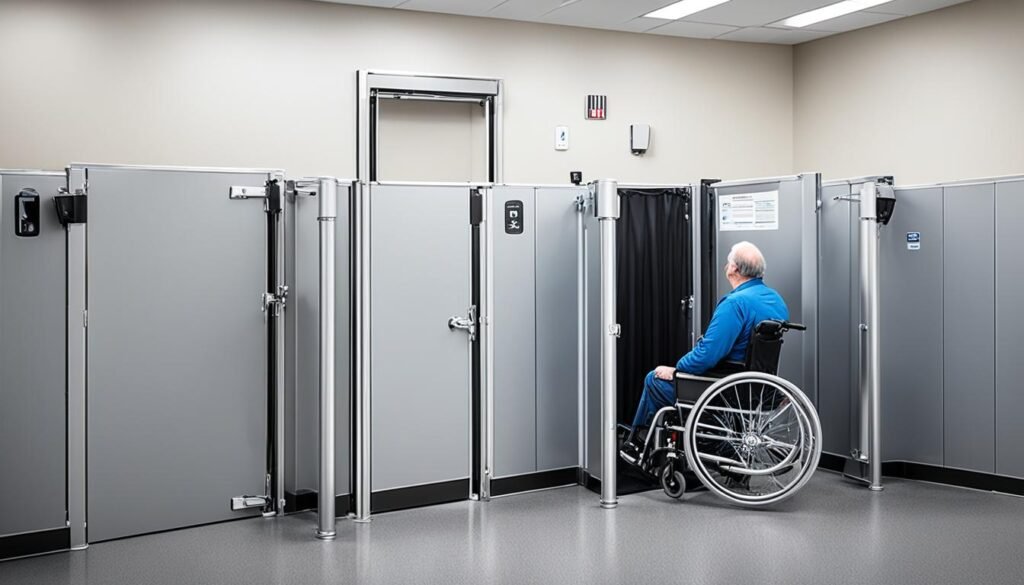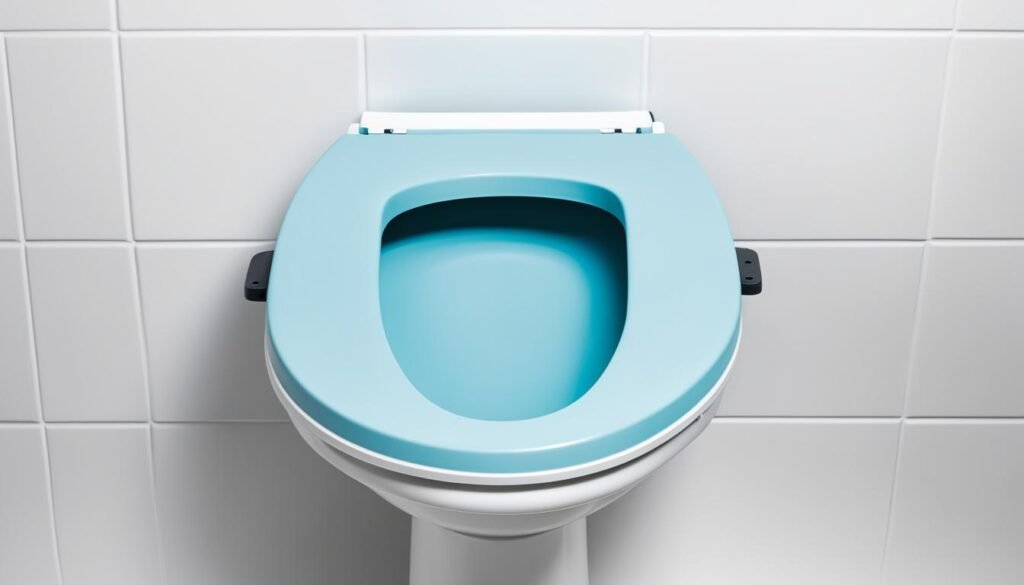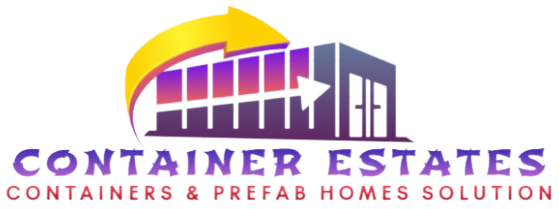For people with disabilities, having easy access to handicap portable restrooms is key. When looking at portable restrooms, it’s important to know what makes them good for accessibility. We’ll cover the top five things to look for in these units.
Key Takeaways
- Ensure the interior design of handicap portable restrooms provide ample maneuvering space for wheelchair users.
- Look for sturdy grab bars and handrails to enhance stability and safety.
- Verify the presence of a ramp and threshold that accommodate easy access.
- Prioritize wheelchair-friendly features like a turning radius and floor space.
- Confirm compliance with ADA standards for optimal accessibility.
Introduction
Accessibility in public restrooms is key. It’s important that everyone can easily use these places, no matter their physical abilities. The Americans with Disabilities Act (ADA) makes sure public spaces, like restrooms, are ready for people with disabilities.
Benefits of Portable Handicap Restrooms
Handicap portable restrooms are great for events, construction sites, or places without enough facilities for people with disabilities. They have the right features for accessibility. This means everyone can have a good and private experience.
- Increased Inclusivity: These restrooms make sure people with disabilities can join in events or go to work without trouble.
- Convenience and Flexibility: They’re easy to move and set up, perfect for short-term or hard-to-reach places.
- Enhanced Safety: With grab bars and wide doors, they make sure users feel safe and steady.
- Compliance with ADA Standards: They meet or beat the Americans with Disabilities Act rules, which is both legal and right.
By using handicap portable restrooms, event planners, builders, and managers show they care about everyone’s access and comfort.
“Accessibility is not just a legal requirement, it’s a moral imperative. Everyone deserves the dignity and comfort of accessible facilities.”
Using handicap portable restrooms makes places more welcoming for people with disabilities. It helps them have the same chances to join in and succeed as others do.
Spacious Interior Design
Designing a handicap accessible portable toilet is more than just following rules. It’s about making a space that’s comfy and easy to use for people with mobility issues. The way the inside is set up is key to making sure everyone has a good experience.
A big part of a good design is having enough room inside. Ample maneuvering space lets people with wheelchairs or walkers move around easily. The turning radius must be big enough for those who can’t move much.
| Feature | Importance |
|---|---|
| Spacious Interior | Allows for easy maneuvering and access for individuals with mobility challenges |
| Turning Radius | Ensures users can comfortably turn and pivot within the portable restroom |
| Grab Bars | Provides stability and support for those who need additional assistance |
| Lowered Fixtures | Enables users in wheelchairs or of shorter stature to access amenities with ease |
The layout and how easy to get to different parts of the handicap accessible portable toilets matter a lot. Grab bars help people who need extra help stay steady. Lowered sinks and toilets make sure everyone can use them easily, no matter their height or mobility.
By focusing on a big, well-thought-out inside and adding features for people with disabilities, handicap accessible portable toilets make sure everyone has a good experience. This careful planning makes these places more accessible and helps people feel more independent.
Handicap Portable Restrooms
Defining Handicap Portable Restrooms
Handicap portable restrooms are made for people with disabilities. They are bigger and have special features like grab bars and wide doors. These make it easier for people in wheelchairs to use them.
Common Use Cases and Scenarios
These restrooms are key at outdoor events and construction sites. They are for places where regular restrooms aren’t available or can’t be reached easily. They make sure people with disabilities can join in and enjoy events without trouble.
Handicap porta potties are bigger than usual, about 60 inches wide and 80 inches deep. They are also 90 inches tall. This size lets people in wheelchairs move around easily and feel comfortable inside.
| Feature | Benefit |
|---|---|
| Wider Entryway | Allows for easy wheelchair access |
| Grab Bars | Provides stability and support for users with limited mobility |
| Ample Maneuvering Space | Enables wheelchair users to turn and navigate the unit comfortably |
The cost to rent a handicap porta potty changes based on the features, how long you need it, and who you rent from. But, these units are crucial for making sure everyone can access places easily, no matter their physical abilities.
Grab Bars and Handrails
Portable handicap toilet rails come with grab bars and handrails that are key for support and stability. They are crucial for the safety and ease of use of disabled portable toilets for hire and disabled portable toilet for sale.
Grab bars and handrails help users move in and out of the portable restroom safely. They also help with balance and stability inside. This is very important for people who have weak upper body strength or need extra support.
- Grab bars should be sturdy, firmly anchored, and positioned at the right height and spot for maximum support.
- Handrails should be easy to grasp, with a size that allows a good grip. They should be placed at the entrance, exit, and inside the portable restroom.
- The design and placement of these features must follow the Americans with Disabilities Act (ADA) guidelines. This ensures the safety and accessibility of the portable handicap toilet rails.
Adding well-designed grab bars and handrails makes disabled portable toilets for hire and disabled portable toilet for sale more user-friendly. It gives users the confidence and stability they need to use the restroom easily and on their own.
Ramp and Threshold
Accessibility is key in handicap portable restrooms. They must have a strong ramp and a smooth threshold. This makes it easy for people in wheelchairs or with mobility issues to get in and out.
The ramp is vital for a gentle slope for wheelchair users. It should be wide enough for the user and any help they need, with a non-slip surface. The threshold should be low or the same height as the ground. This makes it easy to roll in and out.
These features improve the user’s experience and follow ADA standards. They show that portable restroom providers care about being inclusive. They meet the needs of the disabled portable toilet hire and handicap porta potty rental near me communities.
When looking at used handicap portable toilets for sale, check the ramp and threshold closely. They should be strong, wide enough, and have a smooth entrance. These features greatly improve the accessibility and user experience of the portable facility.
Wheelchair-Accessible Features
Choosing a handicap porta john or portable restroom means focusing on features that help people with mobility issues. These features make sure everyone has a safe and comfy experience.
Maneuvering Space and Turning Radius
Having enough space inside is key for wheelchair-accessible restrooms. Users should be able to move and turn their wheelchairs easily. A minimum turning radius of 60 inches is recommended to accommodate most wheelchair sizes and models.
| Feature | Specification |
|---|---|
| Maneuvering Space | Minimum 60-inch turning radius |
| Threshold Height | Maximum 1/2 inch |
| Grab Bars | Installed on at least one side of the unit |
| Wheelchair-Accessible Door | Minimum 32-inch clear width |
With the right space and turning radius, wheelchair users can easily get to and move around in handicap porta john, handicap porta john for sale, j and j portable toilets, k and h portable toilets, or k and r portable toilets. This makes their experience better and more independent.

“Accessibility is not just a buzzword; it’s a fundamental right that empowers individuals with disabilities to participate fully in society.”
Compliance with ADA Standards
When it comes to portable toilet handicap solutions, following the Americans with Disabilities Act (ADA) standards is key. These rules make sure handicap porta potties and portable handicap toilet setups are accessible for people with disabilities.
Understanding ADA Guidelines
The ADA has clear rules for handicap outhouse and porta potty handicap units. These include things like:
- Enough floor space and turning room for wheelchairs
- Grab bars and handrails at the right height for support
- Ramps and threshold heights that make getting in and out easy
- Signs and indicators to show the facility is accessible
Following these standards helps make sure portable toilet handicap options are welcoming to everyone, no matter their physical abilities.
“Accessible design is not just about compliance – it’s about creating an inclusive environment where everyone feels welcome and empowered to participate fully.”
Choosing a handicap porta potties or portable handicap toilet that meets ADA rules does more than just follow the law. It shows a strong commitment to making public spaces accessible and diverse.
It’s important to know and follow these ADA standards. This makes sure everyone using handicap outhouse and porta potty handicap facilities has a good experience.
Rental Options and Pricing
Renting handicap portable restrooms is a smart choice for events, construction sites, or short-term needs. Let’s look at the rental options and pricing to help you decide.
Long-term vs. Short-term Rentals
You can pick between long-term and short-term rentals for portable handicap toilet seats and disabled portable raised toilet seats. Long-term rentals are great for ongoing projects or events. Short-term rentals are better for temporary or one-time needs.
- Long-term rentals: These are a cost-effective choice for projects or events that need ongoing accessibility. Rental periods can last from several months to a year or more.
- Short-term rentals: Ideal for one-time events, short projects, or temporary needs. Rental periods are usually shorter, lasting from a few days to a couple of weeks.
When picking a rental, think about your specific needs, how long you’ll need it, and the total cost. This will help you choose the best option for your situation.
| Rental Options | Typical Pricing |
|---|---|
| Long-term Rentals | $100 – $300 per month, depending on the features and duration |
| Short-term Rentals | $50 – $150 per day, with potential discounts for longer rentals |
Remember, prices can change based on the type of portable handicap shower rental, features, rental length, and the supplier’s location and policies. Always compare options from different suppliers to find the best fit for your needs and budget.

Maintenance and Upkeep
Keeping handicap portable restrooms clean and working well is very important. Used handicap porta potty units need regular care to keep serving everyone’s needs. By following best practices, you can keep your handicap portable toilet at Walmart or other rental sites in great shape.
Proper maintenance means cleaning, servicing, and checking all parts of the toilet. Make sure to check the grab bars, handrails, and ramp often. They should be secure and work right. Also, clean the inside well to keep it hygienic and easy to use.
It’s key to keep an eye on your toilet and fix any problems quickly. This is true whether you rent or buy a used handicap porta potty. Taking good care of it means it will last longer and stay a safe, comfy option for everyone.
FAQ
What are the key features to look for when buying handicap portable restrooms?
When looking for handicap portable restrooms, focus on a big inside space, grab bars, and handrails. Also, a ramp with a smooth entrance and wheelchair-accessible features are key. It’s important they meet ADA standards for accessibility and inclusivity.
What are the benefits of using portable handicap restrooms?
Portable handicap restrooms are great for events, construction sites, or places without enough facilities for people with disabilities. They make things easier and more convenient for those who have trouble moving around.
How important is the interior design of a handicap portable restroom?
The design inside a handicap portable restroom is very important. It needs to be big enough and have enough space to move around. It should also have features that help people with different mobility needs.
What defines a handicap portable restroom, and what are some common use cases?
Handicap portable restrooms are made for people with disabilities. They’re used at events, on construction sites, or anywhere people need better access. They make sure everyone can use the bathroom easily.
Why are grab bars and handrails important in handicap portable restrooms?
Grab bars and handrails are very important. They help people stay safe and stable. This lets people with mobility issues move around the restroom without worry.
What role do the ramp and threshold play in the accessibility of handicap portable restrooms?
A ramp and a smooth threshold are key for easy access. They help people in wheelchairs or with mobility aids get in and out easily. This makes everyone feel welcome and included.
What wheelchair-accessible features should be considered in handicap portable restrooms?
Features like enough space to move and a wheelchair-friendly turning radius are a must. These make it easier for people with mobility issues to use the restroom on their own.
How do handicap portable restrooms comply with ADA standards?
Handicap portable restrooms must follow ADA rules for accessibility. This makes sure they’re safe and welcoming for everyone, including people with disabilities.
What rental options are available for handicap portable restrooms, and how do the costs compare?
You can rent handicap portable restrooms for events, construction sites, or temporary needs. Prices vary based on how long you need it and what your project or event requires.
What are the best practices for maintaining and upkeeping handicap portable restrooms?
Keeping handicap portable restrooms clean and in good shape is key. Regular cleaning and checking that everything works well are important. This ensures a safe and clean experience for everyone.
